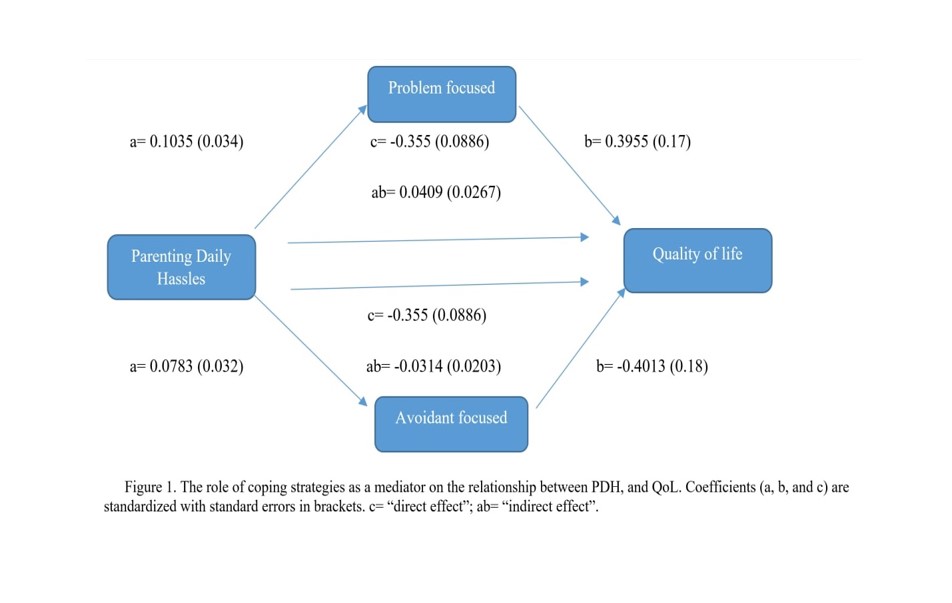The Role of Coping Strategies as a Mediator Between Parenting Daily Hassles and Quality of Life Among Parents of Children with Neurodevelopmental Disorders
DOI:
https://doi.org/10.21271/zjhs.28.SpA.25Abstract
The study’s purpose was to analyze the mediating role of coping strategies between parenting daily hassles (PDH), and quality of life (QoL) in a sample of Kurdish parents of children with neurodevelopmental disorders (NDDs). A non-experimental research design with a quantitative type, a correlative research strategy, and a purposive sampling technique was used to recruit a sample of 206 parents. Three self-report questionnaires were used to collect data, PDH, Brief-Cope, and WHOQOL brief. Independent-Samples t-test, and Process macro procedure were used to analyze the data. Results showed that “problem-focused coping” (PFC), and “avoidant coping” (AC) partially mediated the relationship between PDH, and QoL, while Emotion-focused coping (EFC) didn`t mediate the relationship. As it gathered in the conclusion, two types of coping, PFC and AC strategies were partially mediated the relationship between PDH and parents’ QoL. PFC positively mediated the relationship, while AC negatively mediated the relationship. It means that the more the PFC will be used, the lesser hassles and the better QoL will be perceived, whereas the reverse is true for AC strategy.
References
- Almond, Caroline S (2004) Parenting daily hassles and parents of children with disabilities: relationships to maternal efficacy, maternal satisfaction, and social support. Angewandte Chemie International Edition, 6(11), 951–952.: 2013–2015. Available at: http://getd.libs.uga.edu/pdfs/almand_caroline_s_200412_ms.pdf
- Anita D, James C. C, Gayle D, et al. (1982) Relationship of daily hassles, uplifts, and major life events to health status. Health Psychology 1(2): 119–136. https://doi.org/10.1037/0278-6133.1.2.119.
- Atasoy R and Sevim C (2018) Evaluation of coping strategies with stress of parents who have mentally disabled children in northern Cyprus. Universal Journal of Educational Research 6(6): 1129–1140. DOI: 10.13189/ujer.2018.060601.
- Baron, R.M. and Kenny, D.A. (1986) ‘The Moderator-Mediator Variable Distinction in Social Psychological Research: Conceptual, Strategic, and Statistical Considerations’, Journal of Personality and Social Psychology, 51(6), pp. 1173–1182. DOI: 10.1037//0022-3514.51.6.1173.
- Bornstein, M.H. (2002) Handbook of Parenting. , Lawrence Erlbaum Associates, Inc. 2nd. Edited by M.H. Bornstein. London: Laurence Erlbaum Associates, Publishers.
- Carona, C. (2014) ‘Pediatric Health-Related Stress, Coping and Quality of Life’, Pediatrics Today, 10(2), pp. 112–128. doi: 10.5457/p2005-114.97
- Charles S. Carver (1997) ‘You want to measure coping but your protocol’s too long: Consider the brief COPE’, International Journal of Behavioral Medicine, 4(1), pp. 92–100. DOI: 10.1207/s15327558ijbm0401_6
- Crnic, K.A. and Greenberg, M.T. (1990) ‘Minor Parenting Stresses with Young Children’, Child Development, 61(5), pp. 1628–1637. DOI: 10.1111/j.1467-8624.1990.tb02889.x
- Craig F, Operto FF, de Giacomo A, et al. (2016) Parenting stress among parents of children with Neurodevelopmental Disorders. Psychiatry Research 242. Elsevier: 121–129. DOI: 10.1016/j.psychres.2016.05.016
- Dardas, L.A. et al. (2021) ‘Parenting stress among caregivers of children with neurodevelopmental disorders: A cross-sectional study in Bangladesh’, Journal of Intellectual Disabilities, 31(1), pp. 1–13. DOI: 10.1177/17446295211002355
- Fairfax, A. et al. (2019) ‘A systematic review of the association between coping strategies and quality of life among caregivers of children with chronic illness and/or disability’, BMC Pediatrics, 19(1), pp. 1–16. DOI: 10.1186/s12887-019-1587-3
- Lazarus RS (1999) Stress and Emotions. New York, NY: Springer Publishing Company.
- Francés, L. et al. (2022) ‘Current state of knowledge on the prevalence of neurodevelopmental disorders in childhood according to the DSM-5: a systematic review in accordance with the PRISMA criteria.’, Child and adolescent psychiatry and mental health, 16(1), p. 27. doi: 10.1186/s13034-022-00462-1
- Gamarra, P. del P.D. et al. (2020) ‘Impact of disability on the family’, Palarch’s Journal Of Archaeology Of Egypt/Egyptology, 17(6), pp. 14711–14729. Available at: https://archives.palarch.nl/index.php/jae/article/view/4887. (Accessed 1 march 2023).
- Gray, D.E. (2006) ‘Coping over time: The parents of children with autism’, Journal of Intellectual Disability Research, 50(12), pp. 970–976. https://doi.org/10.1111/j.1365-2788.2006.00933.x
- Hayes, A.F. and Rockwood, N.J. (2017) ‘Regression-based statistical mediation and moderation analysis in clinical research: Observations, recommendations, and implementation’, Behaviour Research and Therapy, 98, pp. 39–57. DOI: 10.1016/j.brat.2016.11.001
- Holmes, T.H. and Rahe, R.H. (1967) ‘The social readjustment rating scale’, Journal of Psychosomatic Research, 11(2), pp. 213–218. https://doi.org/10.1016/0022-3999(67)90010-4.
- Hussain A and Juyal I (2007) Stress Appraisal and Coping Strategies among Parents of Physically Challenged Children. Journal of the Indian Academiy of Applied Psychology 33(2): 179–182.
- Jambekar, A. et al. (2018) ‘Impact of having a child with special needs on the psychosocial well-being of the parents: A cross-sectional study’, Journal of Mental Health and Human Behaviour, 23(2), p. 115. doi:10.4103/jmhhb.jmhhb_24_18
- Kanner AD, Coyne JC, Schaefer C, et al. (1981) Comparison of two modes of stress measurement: Daily hassles and uplifts versus major life events. Journal of Behavioral Medicine 4(1): 1–39. https://doi.org/10.1007/BF00844845
- Lazarus, R.S. and Folkman, S. (1984) Stress, Appraisal, and Coping. New York: Springer Publishing Company, Inc.
- Lazarus RS, DeLongis A, Folkman S, et al. (1985) Stress and Adaptational Outcomes. The Problem of Confounded Measures. American Psychologist 40(7): 770–779. https://doi.org/10.1037/0003-066X.40.7.770
- Nesteruk O (2003) The relationship between family daily hassles and family coping and managing strategies. DOI: 10.31390/gradschool_theses.2452. Available at: https://digitalcommons.lsu.edu/gradschool_theses/2452.
- Ni’matuzahroh, Suen MW, Ningrum V, et al. (2022) The Association between Parenting Stress, Positive Reappraisal Coping, and Quality of Life in Parents with Autism Spectrum Disorder (ASD) Children: A Systematic Review. Healthcare (Switzerland) 10(1): 1–30. DOI: 10.3390/healthcare10010052
- Predescu, E. and Şipoş, R. (2013) ‘Cognitive coping strategies, emotional distress and quality of life in mothers of children with ASD and ADHD—A comparative study in a Romanian population sample’, Open Journal of Psychiatry, 03(02), pp. 11–17. DOI: 10.4236/ojpsych.2013.32A003
- Peer JW and Hillman SB (2014) Stress and Resilience for Parents of Children With Intellectual and Developmental Disabilities : A Review of Key Factors and Recommendations for Practitioners. 11(2): 92–98. https://doi.org/10.1111/jppi.12072
- Schäfer, A., Pels, F. and Kleinert, J. (2020) ‘Coping strategies as mediators within the relationship between emotion-regulation and perceived stress in teachers’, International Journal of Emotional Education, 12(1), pp. 35–47. A vailable at: https://files.eric.ed.gov/fulltext/EJ1251784.pdf
- Santos AF de O and Cardoso CL (2010) Mental Health Professionals: Stress, Coping and Quality of Life. Psicologia: Teoria e Pesquisa 26(3): 543–548. https://doi.org/10.1590/S0102-37722010000300017
- Turnage, D. (2019) ‘Stress, Coping, and Quality of Life Among Parental Caregivers of Children with Autism Spectrum Disorder’. Available at: http://purl.fcla.edu/fcla/etd/CFE0007737
- United Nations Children’s Fund (2021) Seen, Counted, Included: Using data to shed light on the well-being of children with disabilities: UNICEF. New York. Available at: https://data.unicef.org/resources/children-with-disabilities-report-2021/
- Uzair, I.Z. et al. (2015) ‘The Correlation between Coping Mechanism Score and Quality of Life Score among Parents Living with Disabled Children in Kelantan, Malaysia.’, International Medical Journal, 22(6), pp. 462–465. doi: 10.21315/mjms2017.24.1.9
- Vernhet, C. et al. (2018) ‘Coping strategies of parents of children with autism spectrum disorder: a systematic review’, European Child and Adolescent Psychiatry, 28(6), pp. 747–758. DOI: 10.1007/s00787-018-1183-3
- Younan, L. et al. (2019) ‘The translation and cultural adaptation validity of the actual scope of practice questionnaire’, Eastern Mediterranean Health Journal, 25(3), pp. 181–188. DOI: 10.26719/emhj.18.028

Downloads
Published
How to Cite
Issue
Section
License
Copyright (c) 2024 Sarhang Ibrahim Saeed, Rushdi Ali Merza

This work is licensed under a Creative Commons Attribution 4.0 International License.
Except where otherwise noted, content on this site is licenced
under a Creative Commons Attribution License 4.0 (CC BY- 4.0)









